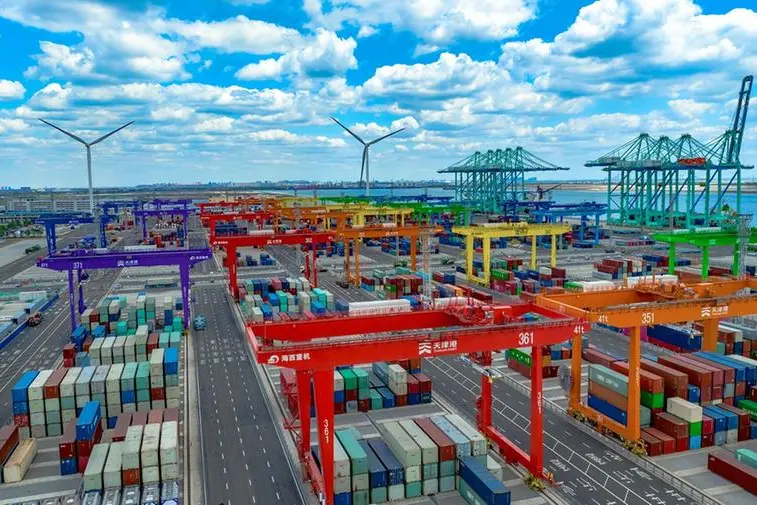PHOTO
Ras Al Khaimah Economic Zone (RAKEZ) and China’s Tianjin Pilot Free Trade Zone (Tianjin FTZ) entities entered into a landmark partnership to strengthen economic ties and foster cross-border opportunities between Ras Al Khaimah and China.
The business relations were formalised through a Strategic Cooperation Agreement with China (Tianjin) Pilot Free Trade Zone and a Memorandum of Understanding (MoU) with Tianjin Port Free Trade Zone.
The Strategic Cooperation Agreement was signed by Zhu Changcun, Director-General of the Office of China (Tianjin) Pilot Free Trade Zone Administration, and Ramy Jallad, Group CEO of RAKEZ. Additionally, Jallad signed an MoU with Xu Haitao, Director of the Investment Promotion Bureau at the Tianjin Port Free Trade Zone Administrative Committee.
The signing marks the start of joint efforts in facilitating trade, investment opportunities, and industry development between the two regions.
Through this collaboration, RAKEZ and Tianjin FTZ seek to accelerate mutual growth by attracting foreign direct investment and enhancing the economic ecosystems in both regions. It will also enable the exchange of expertise and resources, fostering the development of key sectors while positioning both zones as prime destinations for cross-border business expansion and collaboration.
Jallad said, “The Strategic Cooperation Agreement and MoU between RAKEZ and Tianjin FTZ mark a transformative step towards strengthening the industrial capabilities of Ras Al Khaimah and enhancing our global partnerships. Our collaborations with various Chinese business groups, and now a free zone, are part of our mission to foster economic growth and sustainability while also driving local and regional development. By uniting our resources and visions, we are setting the stage for a future where both regions thrive through mutual support and shared opportunities in key sectors.”
He further added, “RAKEZ is home to over 250 Chinese businesses thriving across diverse sectors like manufacturing, trading, hi-tech, electric vehicles, and renewable energy. This alliance strengthens our commitment to support Chinese investors looking to enter the Middle Eastern markets through Ras Al Khaimah. Recently, we have marked a significant uptick in interest from Chinese firms, drawn by our strategic location and robust business solutions. This increasing engagement from China reflects our position as a premier international business hub, particularly appealing in times when global markets are in search of sustainable growth opportunities.”
Yin Xiaofeng, the Party Secretary of CPC Committee of Tianjin Port Free Trade Zone, the President of the Administrative Committee of Tianjin Port Free Trade Zone, and the Deputy President of China (Tianjin) Pilot Free Trade Zone Administration, pointed out that, “The Tianjin Port Free Trade Zone has significant locational advantages, a strong industrial foundation, and comprehensive production factors, along with a leading edge in institutional innovation.” He expressed a desire “to strengthen cooperation with the RAKEZ in fields such as petrochemicals, renewable energy, shipping and logistics, marine economy, automotive trade, and industrial investment, to complement each other’s strengths in technology, capital, resources, markets, and other aspects, achieving win-win development”.
He emphasised making full use of RAKEZ’s advantages as a gateway hub to the Middle East, South Asia, and North Africa, with superior transportation conditions and highly liberal policies for investment, trade, and foreign exchange as well among other policies. This will help Tianjin enterprises expand into Ras Al Khaimah, enter the Middle East, and pursue overseas development, fruitfully collaborating across the two regions.
RAKEZ continues to deepen its engagement with China, focusing on long-term collaboration that drives innovation, economic growth, and mutual prosperity. These efforts are aimed at positioning both regions for future success, creating a foundation for sustainable development and expanding opportunities in emerging sectors.





















